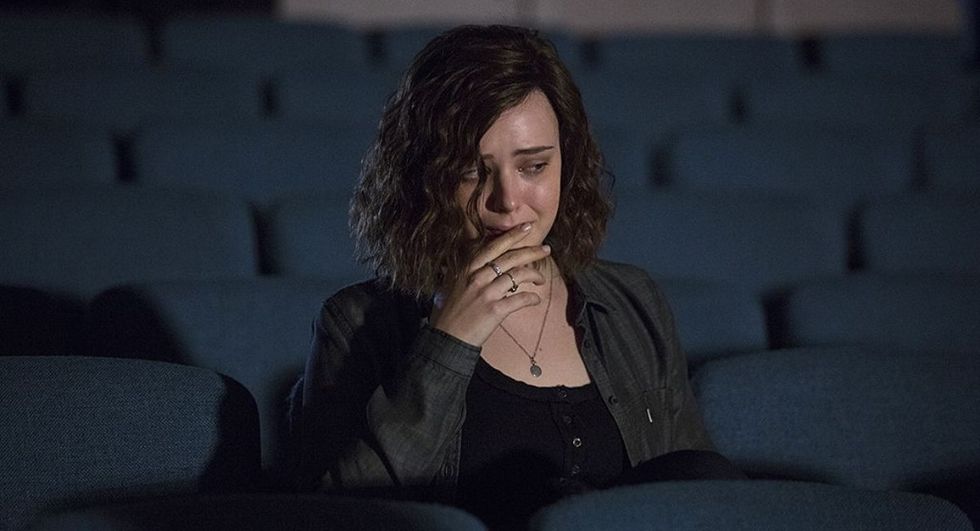When it comes to mental health, and specifically the issue of suicide, it is important to be able to have a conversation about it in order to break the stigma. But, there is a huge difference between glorifying and educating, and, as a society, we're doing it ALL WRONG.
Education and conversation are necessary, glorification and promotion are not.
The main example of misrepresenting suicide in pop culture currently is "13 Reasons Why." The show, which is based on a book by Jay Asher with the same title, focuses on Hannah Baker, a teen who commits suicide and leaves 13 recordings explaining why she killed herself.
According to a recent study following the release this Netflix original series, in the nine months after the show aired, there were 195 more deaths by suicide in 10 to 17-year-olds than what was expected from seasonal patterns alone. This is not a coincidence.
Combining the fact that teenagers and pre-teens are young and impressionable with the fragility of mental illness, it should be obvious that introducing suicidal behavior in such an intimate and visible way will affect those who are seeing it. From a young age and into adulthood, people tend to mimic the behaviors of those around them and those that they constantly see. Watching shows or movies that have a constant theme of suicide, in turn, can lead to an increase of suicidal behavior.
Further explaining this idea, director of the Center for Suicide Prevention and Research at Nationwide Children's Hospital Jeff Bridge said that contagion (the increasing spread/increase of suicide) can be "fostered by stories that sensationalize or promote simplistic explanations of suicidal behavior, glorify or romanticize the decedent, present suicide as a means of accomplishing a goal, or offer potential prescriptions of how-to die by suicide."
This simply means that the rising rate of suicide can be in part due to the way suicide is presented in the media because the media shows suicide as a goal to be achieved or a statement to be made, and oftentimes these media outlets even offer ways for suicide to successfully be committed.
The main issue that arises from "13 Reasons Why" and media like it is the fact that they portray mental illness as something you cannot recover from.
Media only shows two real options: suffering from extreme and severe 'symptoms' for the rest of your life or ending this by committing suicide.
This type of portrayal seemingly validates the type of behavior that we should be trying to move away from because, realistically, recovery is possible when you explore the many treatment options that are available.
Treatment options can include therapy, medicine, hospitalization, support groups, mentorships, and more. In order to accurately portray mental health in the media, the sole-solution of suicide needs to be abandoned and the realistic recovery options should be emphasized and practiced.
Another common misrepresentation is that therapy and psychiatric hospitals/care cause more harm than they do good. Commonly shown as dark and isolated, if shown at all, this portrayal pushes those who are struggling with mental health away from seeking out treatment with the fear of 'being locked up.'
The science and education behind mental disorders have advanced so much recently that we need to stop the 18th-century idea of "insane asylums" and look at treatment facilities realistically. While it is historically accurate that mental illness was seen as demonic and evil, these thoughts have long been proved otherwise, so the treatment options should be modernized as well.
As someone who has struggled with mental illness and suicidal thoughts/tendencies, I see the urgency of this issue and the need for it to be addressed sooner rather than later.
Thinking about when I was at the deepest point in my struggles, I fear what would have happened to me had I seen so much media validating suicide.
When suicide is presented as the only effective option and recovery seems like an impossible task, this forces those who are struggling to see suicide as a positive escape from the horrors of their reality. This allows for the rationalization that suicide is an acceptable answer even though it is never the solution.
This type of glorification is detrimental not only to those who suffer from mental illness, but it also affects general viewers. Media companies are monetizing on the misrepresentation of mental illness and are miscommunicating the realities of mental illness in order to create addicting television.
However, what must be realized is that the value of human life and overcoming mental health issues is more important than the value of a good movie to watch or show to binge-watch.
Suicide is a permanent solution to a temporary problem, and if we want to have healthy conversations surrounding mental illness, we need to stop making mental illness look like something that is beautifully tragic and stop making suicide look like something so glorified.
If you or someone you know is experiencing suicidal thoughts, call the National Suicide Prevention Hotline — 1-800-273-8255


















